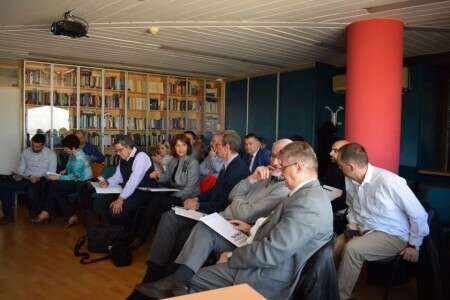A round table on the topic of establishing and running local energy efficiency funds was held on Tuesday, April 3rd, in the premises of Belgrade Open School. The meeting, organized by Belgrade Open School and RES foundation, was attended by representatives of cities and municipalities from many different areas of Serbia, as well as representatives of the Standing Conference of Towns and Municipalities (SCTM), expert associations and civil society representatives.
The meeting was organized with the aim to initiate a discussion on establishing and running local energy efficiency funds in Serbia from different aspects, particularly in the context of recent legislative changes. The round table started with opening remarks from Ms Mirjana Jovanović from Belgrade Open School and Mr Aleksandar Macura from RES foundation and continued with presentations and a discussion between participants. Representatives of SCTM delivered a presentation on developing model decisions for towns and municipalities, necessary for full implementation of recently adopted Law on housing and household’s maintenance. A representative of the Government of Vojvodina region presented the Guarantee Fund that they’ve established. Representatives of cites and municipalities shared their experience related to improving energy efficiency, both in public and housing sector.
The number of cities and municipalities dedicated to improving energy efficiency has been growing continuously over the past few years. The legal framework for energy efficiency in public sector is pretty clear and there are various funds available, such as funds offered by the Public Investment Management Office, international development banks, Ministry’s Energy Efficiency Fund, as well as local energy efficiency funds, planned in accordance with the Law on Efficient Use of Energy.
However, demand for energy efficiency projects is high in the housing sector as well. It’s more difficult for the citizens to get funding for energy efficiency improvement projects in their homes, taking into account the limited access to the bank market and less predictability, which makes energy efficiency investments expensive, despite the fact that they pay off in the long term. Cities and municipalities have responded to the needs of their citizens by establishing various models for financing energy efficiency projects. These efforts, however, put cities and municipalities at risk of breaking the law, since public funds are used in a controversial manner, for the well-being of private citizens who do not fall under the category of vulnerable groups.
However, the latest Law on housing and household maintenance seems to be opening the door towards public investments in private housing sector. Some of the provisions of this Law allow cities and municipalities to spend public money on improving energy efficiency of private buildings, for the purpose of public interest and with the right to demand a refund from the apartment owners – however, they are free to decide whether they’ll demand a refund or no.
Although meeting participants had different views on public investment in private housing sector, all of them have agreed on the importance of further energy efficiency improvements, with the aim of saving energy, improving the quality of life and environment protection. Therefore, they agreed to keep up with the meetings, consultations and talks on energy efficiency, in order to exchange their experience so far, having in mind both the necessity of energy efficiency improvement and compliance with the law.
Author of the photo: Belgrade Open School


